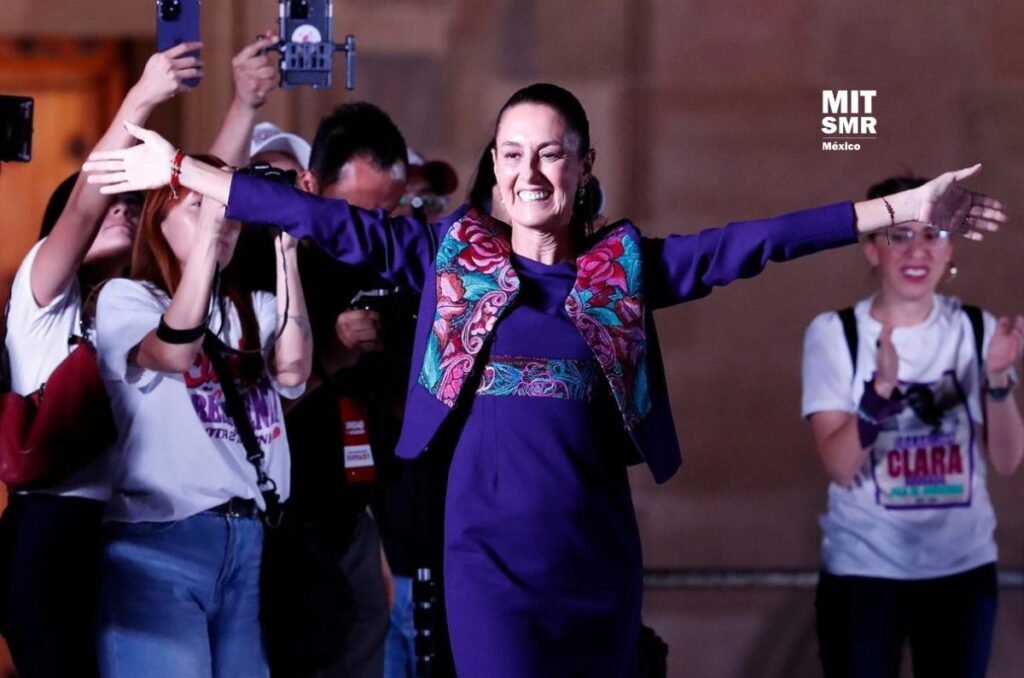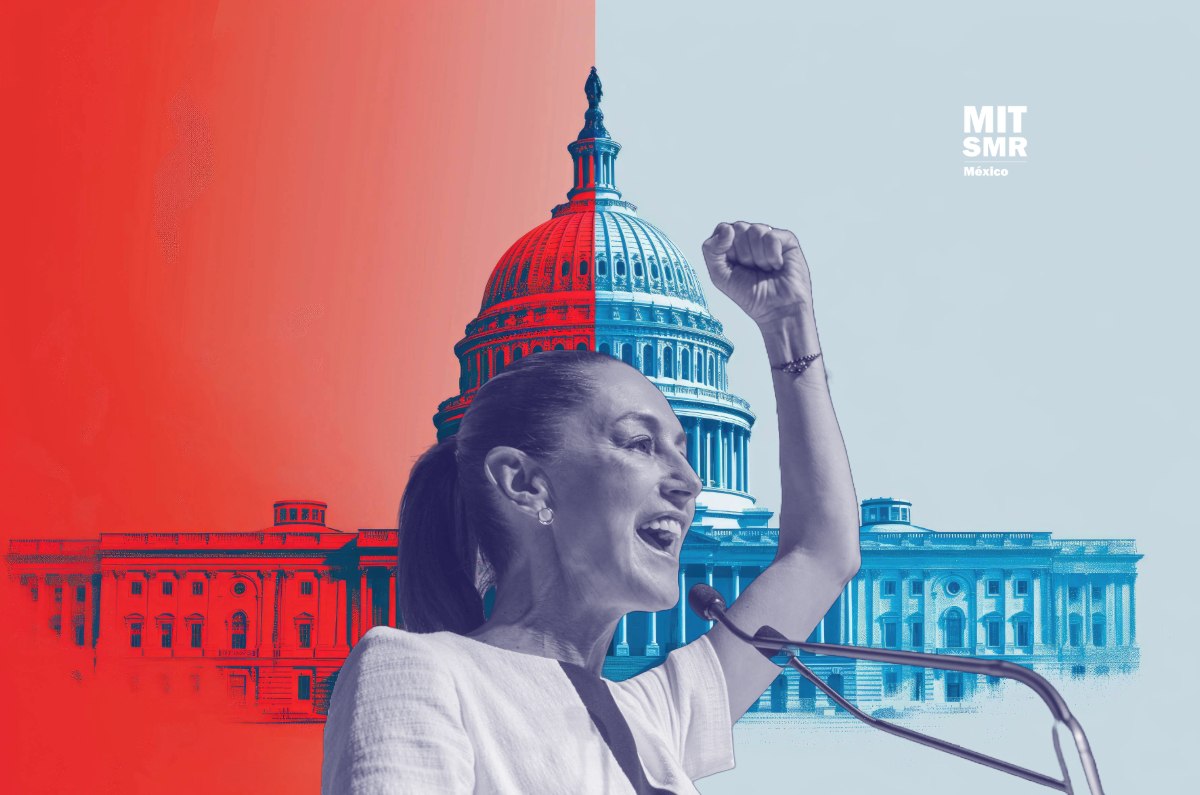Can Sheinbaum expect Trump to be an ally on immigration? Maybe. Lopez Obrador found common ground and had a relatively calm and fruitful relationship with Trump. Despite his claims that “Mexico will pay for the wall”, nothing notable happened, there weren’t any angry discourses or insults.
It’s been a couple of weeks since Mexico held its presidential election and we can now get past the initial headlines and start focusing on the enormity of issues that new Mexican President Claudia Sheinbaum will face.

It could have been either candidate
Yes, electing a woman president in Mexico is historic, but the way the issue was positioned in the Mexican and American press could not have been more different.
Every headline in the U.S. focused on Mexico electing its first woman president. Some provided more context than others, but if you substituted the candidate’s names, you would still have the same article – maybe even a better narrative with Xochitl considering her indigenous roots.
For those paying attention and not just reacting to the election results, the fact that Mexico would elect its first woman president was already a guarantee more than a year ago when the two front-runners were identified.
Consequently, to the Mexican electorate and news outlets the narrative was not focused on the new president’s gender. To them, the story was the rise in popularity of Morena, its significant political gains in all levels of government, and what that means for the country’s political stability and economy.
The candidate could have been anybody Lopez Obrador appointed as his successor; he chose Sheinbaum, and she was elected on the coattails of his popularity. Sound familiar? It’s not that different from what the PRI did for more than 70 years, it’s exactly what Lopez Obrador despised.
I mean, he ran three prior presidential campaigns based on that argument.
Claudia Sheinbaum hace historia: “Me convertiré en la primera presidenta de México”
The nonexistent Mexican-American influence
“This sets an example for the U.S. How come Mexico did it first and we couldn’t?”
I heard that commentary frequently.
What people fail to understand is that Mexico has long stopped fitting the political narrative of a male-dominated society or the “machista” stereotype.
In recent history, even at its most conservative (the Fox and Calderón presidencies), Mexico has more rapidly adopted progressive social policies than the United States – LGBTQ+ rights and same sex marriage are a perfect example.
A friend emotionally asked me:
“Wasn’t it great to see how many dual citizens were involved and made a difference in helping elect the first woman president?”
No, I answered. That’s a fallacy, and it’s part of a narrative you want to believe. It’s a romanticized idea that Mexican-Americans have an influence in the Mexican elections. It’s a form of connection to our heritage, a connection to the motherland, but it is not political influence.
The numbers don’t support that argument. According to the INE (Mexico’s National Electorate Institute) there were over 180,000 ballots cast by Mexican voters world-wide, with about half of those voting in the United States.
That’s hardly enough to make a difference. The narrative and news stories showing people standing in line for hours to vote only applied to individuals hoping they were one of the lucky few to receive a provisional ballot. Only 1,500 provisional ballots were provided to special precincts located at Mexican consulates – mostly in Los Angeles, Dallas, and Chicago.
Voting in the Mexican election was something people had to prepare for months in advance. Those wishing to cast a ballot needed to have a current voter identification card and had to pre-register before February 25. Their ballots were also cast electronically.
Joe Biden felicita a Claudia Sheinbaum por su virtual triunfo histórico
America, America, America
President elect Sheinbaum has three complex issues that are front and center –immigration, the economy, and public safety.
America has a vested interest in addressing all these issues, and it will play a critical role in defining her presidency. That’s bad news for her, regardless of whoever wins the U.S. presidential election.
I will be covering each topic in further detail in the coming days and given that Biden made this his top issue earlier this week, let’s start with immigration.
Mexico will undoubtably become the “political piñata” in the upcoming U.S. presidential debates; the first one will take place in just 7 days. Both candidates recently had campaign stops in Arizona and Nevada to discuss border security and immigration. The White House announced policies and new protections for DACA recipients and undocumented spouses of U.S. citizens.
That’s good news for those impacted, but they are already in the U.S. How about those who are living in limbo at the U.S.-Mexico border? Let’s be clear, addressing border security through DACA and stopping the influx of border crossings are two very distinct issues.
In fact, a day after her electoral victory, Biden presented Sheinbaum with a “gift” of a political bomb in the form of an executive order that limits crossings and seals the border to most asylum seekers.
He issued the order in response to the low levels of approval he has on border security. Ultimately, what this means is that those seeking asylum must continue to wait in Mexico for their turn to have their case heard.
This process can take years and a hearing isn’t even guaranteed. It leaves these immigrants in limbo and vulnerable in a foreign land that they only thought was a transitional stop. A land that is now is home for the foreseeable future, and maybe even forever.
Wasn’t this the same policy that President Trump enacted when he limited asylum seekers and faced great criticism from Democrats? Yes. What can Sheinbaum do about it? Nothing.
I can almost hear both candidates stating that “working with President Sheinbaum to strengthen Mexico’s southern border” is a top priority.
Biden will rely on the rhetoric that America is a country of immigrants, that immigrants are key contributors to its economy, and that he has tasked Vice President Harris with addressing the underlying issues that are causing the mass migration out of countries in Central and South America, and Mexico itself.
He will rightfully point out that he had proposed a comprehensive border security and immigration bill that had bipartisan support, and that Trump instructed the Republican Party to kill the legislation. It’s true, Trump wouldn’t allow Biden to have a political victory on the issue on an election year.
Can Sheinbaum expect Trump to be an ally on immigration? Maybe. Lopez Obrador found common ground and had a relatively calm and fruitful relationship with Trump. Despite his claims that “Mexico will pay for the wall”, nothing notable happened, there weren’t any angry discourses or insults.
They were two populists who understood they had more in common than not. This might be a best-case scenario for her, but she also needs to prepare for a worst-case scenario. To deal with his misogyny, with his dismissals, and aggression.
Whether it is Biden or Trump, Sheinbaum doesn’t win on this issue. Who is going to pay for the necessary resources to truly enforce that? Is anybody is going to help Mexico pay for the shelters and the basic necessities of the asylum seekers? She can’t expect this policy to be reversed anytime soon, and it’s a ticking time bomb.
The inconsistent asylum policies of the U.S. have left hundreds of thousands of people stranded in Mexico, and it has started to create a strong anti-immigrant feeling that is festering in places like Mexico City, Tijuana, and Ciudad Juarez. Oh, how ironic that is.
La importancia del voto latino en EU y la inesperada popularidad de Trump
Te recomendamosGeorge I. Gonzalez
Fundador de la firma Complex Made Simple. Experto en comunicaciones de política pública y comentarista Fundador de Complex Made Simple y experto en comunicaciones politicas y corporativas. Originario de CDMX. Fue designado de la Casa Blanca y subsecretario de prensa de desarrollo urbano y vivienda. También fue gerente de comunicaciones de política pública de Facebook en Washington D.C.y recibe contenido exclusivo







